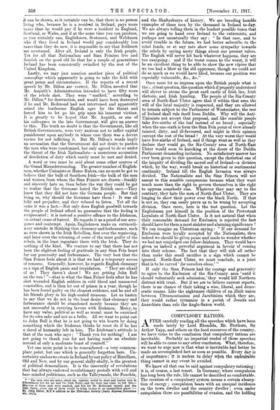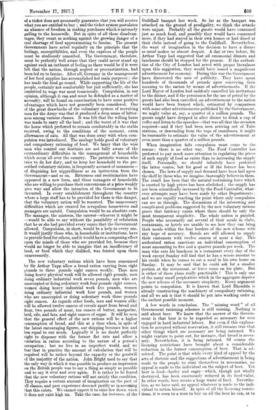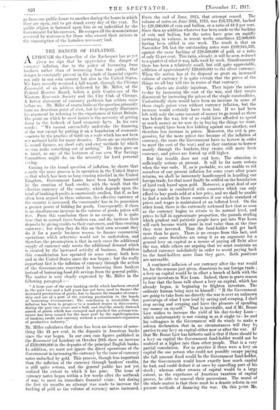COMPULSORY RATIONS.
AFTER carefully reading all the speeches which have- been made lately by Lord Rhondda, Mr. Prothero, Sir Arthur Yapp, and others on the food.resources of the country, we have come to the conclusion that compulsory rations are inevitable. Probably no impartial reader of those speeches will be able to come to any other conclusion. What, therefore, we want to urge now is that what is inevitable had better be made an accomplished fact as soon as possible. Every day is of importance; it is useless to delay when the undesirable thing cannot in any event be avoided.
We know all that can be said against compulsory rationing ; it is, of course, a last resort. In Germany, where compulsion has long been the rule, life cannot be described as comfortable. The creation of a compulsory system means a certain absorp- tion of energy ; compulsion bears with an unequal incidence on the town dweller and the country dweller ; even under compulsion there are possibilities of evasion, and the hording
of a ticket does not necessarily guarantee that you will receive what you are entitled to buy ; and the ticket system postulates an absence of freedom in making purchases which is intensely galling to the housewife. But in spite of all these disadvan- tages, they count as nothing against the growing danger of a real shortage of food approximating to famine. The present Government have acted regularly on the principle that the feelings, susceptibilities, and even the caprices of the people must be studiously consulted. The Government, therefore, must be perfectly well aware that they could never stand up against such an outburst of feeling as there would be if it were felt that the nation, through neglect or procrastination, had been led on to famine. After all, Germany in the management of her food supplies has accomplished her main purposes : she has made the food go round. While supporting the life of the people, certainly not comfortably but just sufficiently, she has contrived to wage war most tenaciously. Compulsion, in our opinion, although it can and must be defended as a matter of necessity, will be found on examination to have some positive advantages which have not generally been considered. One of the great drawbacks of the voluntary system of recruiting men for the Army was that it produced a deep sense of bitter- ness among various classes. It was felt that the willing horse was made to carry all the load ; and the worst of it was that the horse which preferred to remain comfortably in the stable received, owing to the conditions of the moment, extra allowances of oats. All that was done away with when com- pulsion was introduced. The analogy holds good of voluntary and compulsory rationing of food. We fancy that the wise men who control our destinies are not fully aware of the extraordinary difficulties in the management of households which occur all over the country. The patriotic woman who tries to do her duty, and to keep her household to the pre- scribed voluntary rations, is frequently accused of meanness— of disguising her niggardliness as an instruction from the Government—and so on. Bitterness and recrimination have appeared in a new form, and thbse managers of households who are willing to purchase their convenience at a price weakly give way and allow the intention of the Government to be thwarted. In every establishment throughout the country where a large staff has to be provided for -there is this danger, that the voluntary ration will be resented. The unnecessary difficulties which are created for scrupulous housewives and managers are untold. Compulsion would be an absolute cure. The manager, the mistress, the caterer—whoever it might be —would be able to say without the possibility of refutation that he or she had provided every ounce that the Government allowed. Compulsion, in short, would be a help to every one. It would justify those who, in households or institutions, have to provide food for others, audit would have a composing effect upon the minds of those who are provided for, because they would no longer be able to imagine that an insufficiency of food, or food which they disliked, was foisted upon them unnecessarily.
The new voluntary rations which have been announced by Sir Arthur Yapp allow a bread ration varying from eight pounds to three pounds eight ounces weekly. Thus men doing heavy physical work will be allowed eight pounds, men doing ordinary industrial work seven pounds, men who are unoccupied or doing sedentary work four pounds eight ounces, women doing heavy industrial work five pounds, women doing ordinary industrial work four pounds, and women who are unoccupied or doing sedentary work three pounds eight ounces. As regards other foods, men and women alike will be allowed twelve ounces of cereals apart from bread and flour, two pounds of meat, ten ounces of butter, margarine, lard, oils, and fats, and eight ounces of sugar. It will be seen that the general effect of the new rations will be a higher consumption of bread, and this at a time when, in spite of the latest encouraging figures, our shipping becomes less and less equal to our needs. Logically it is no doubt perfectly right to dispense with the former fiat rate and allow a variation in ration according to the nature of a person's occupation ; but we live in an imperfect world, and we fear that in practice the amount of calculation that will be required will be rather beyond the capacity or the goodwill of the majority of the nation. John Bright used to say that the only way in which it was possible to produce an impression on the British people was to say a thing as simply as possible and to say it over and over again. It is rather to be feared that the new voluntary rations will not satisfy this condition. They require a certain amount of imagination on the part of all classes, and past experience does not justify us in assuming that this exists. We cannot expect it to exist low down when it does not exist high up. Take the case. for instance. of the Guildhall banquet last week. So far as the banquet was attacked on the ground of prodigality, we think the attacks were unjust. Probably all the guests would have consumed just as much food, and possibly they would have consumed more, if they had stayed in their own homes or had dined at their clubs instead of going to the Guildhall. Nevertheless. the want of imagination in the decision to have a dinner as usual makes us almost despair. A day or two before, Sir Arthur Yapp had suggested that all ceremonial dinners and luncheons should be stopped for the present. If the authori- ties of the City of London had acted with proper literalness upon this suggestion, they would have issued a magnificent advertisement for economy. During this war the Government have discovered the uses of publicity. They have spent hundreds of thousands of pounds upon conveying their meaning to the nation by means of advertisements. If the Lord Mayor of London had suddenly cancelled his invitations to the dinner, and if the permission for the use of petrol by the guests had also been cancelled, an advertisement to the nation would have been framed which, estimated by comparison with some other advertisements published by the Government, we might value at, say, a quarter of a million pounds. The guests might have dropped in after dinner to drink a cup of coffee and listen to the speeches—that was all that the occasion required—and if they had been seen arriving out of Tube stations, or descending from the tops of omnibuses, it might be reasonable to estimate the value of the advertisement at even more than a quarter of a million pounds.
When imagination fails compulsion must come to the rescue ; there is no other way. The Food Controller has preferred to pay much more attention to regulating the prices of such supply of food as exists than to increasing the supply itself. Personally, we should infinitely have preferred the latter course, but for good or ill the former has been chosen. The laws of supply and demand have been laid upon the shelf by those who, we imagine, thoroughly believe in them. The result has been that the natural restraining force which is exerted by high prices has been abolished ; the supply has not been scientifically increased by the Food Controller, what- ever attempts may have been made by other Departments ; and we are rapidly reaching the point where only compulsion can see us through. The discussions of the interesting and complicated problems suggested by the new voluntary rations prove that intricacy exists where there should be only the most transparent simplicity. The whole nation is puzzled. People who necessarily eat several of their meals in clubs, restaurants, or hotels are unable to see haw they can bring their meals within the four borders of the new scheme with any hope of accuracy. Hotels are still allowed to supply their customers with twelve ounces of meat a day. This authorized ration sanctions an individual consumption of meat amounting to five and a quarter pounds per week. The man who eats his luncheon in a restaurant every day of the week except Sunday will find that he has a minus amount to his credit when he comes to eat a meal in his own home on Sunday. It may be said that he could ask for a smaller portion at the restaurant, or leave some on his plate. But is either of these plans really practicable I This is only one of the many small perplexities which in the aggregate deprive the new scheme of the necessary simplicity. Every argument points to compulsion. It is known that Lord Rhondda is already constructing the machinery of compulsory rationing, and all we ask is that it should be put into working order at the earliest possible moment.
A few words in conclusion. The " missing word " of all Government rationing schemes is still missing. Nothing is said about beer. We know that the answer of the Govern- ment is that beer is to be regarded as necessary for men engaged in hard industrial labour. But even if this explana- tion beaccepted without reservation, it still remains true that other things which are necessary are being rationed. We might venture to point out, for instance, that bread is neces- sary. Nevertheless, it is being rationed. Of course the licensing restrictions have brought about a considerable reduction in the former consumption of beer. That is ad- mitted. The point is that while every kind of appeal by the arts of rhetoric and the suggestions 4 advertisement is being made to the people to stint themselves in necessaries, no appeal is made to the individual on the subject of beer. Yet beer is food—barley and sugar—which, though not wholly destroyed, has been enormously reduced in its food-value. In other words, beer means a huge waste of food. Neverthe- less, as we have said, no appeal whatever is made to the indi- vidual to ration himself. In spite of all the licensing restric- tions. it is (men to a man to buy up all the beer he can, or to
go from one public-house to another during the hours in which they arc open, and to get drunk every day of the year. No public stigma is fastened upon him as an individual by the Government for his excesses. lie escapes all the denunciations reserved by statesmen for those who exceed their rations in the consumption of the harmless necessary loaf.
















































 Previous page
Previous page